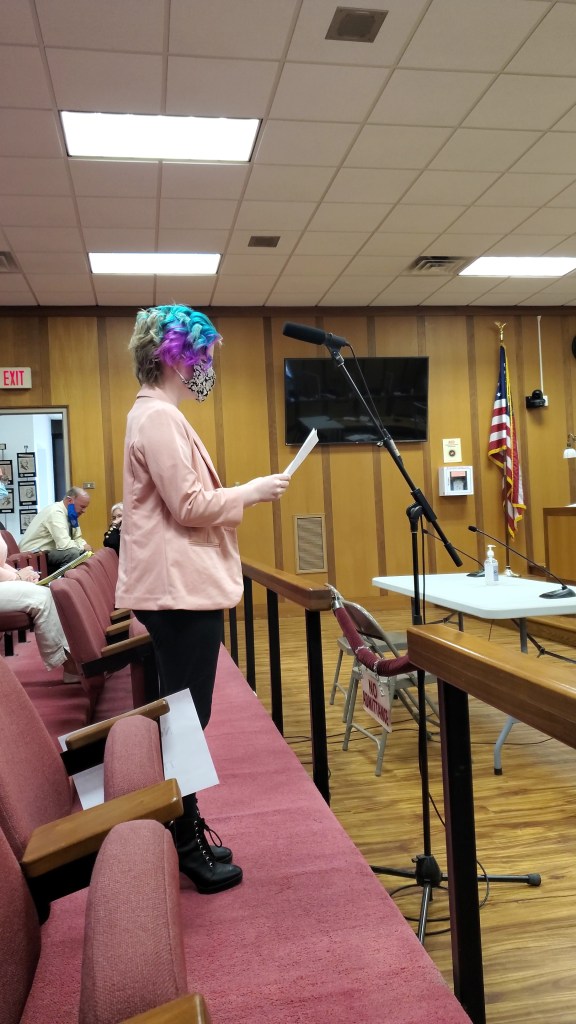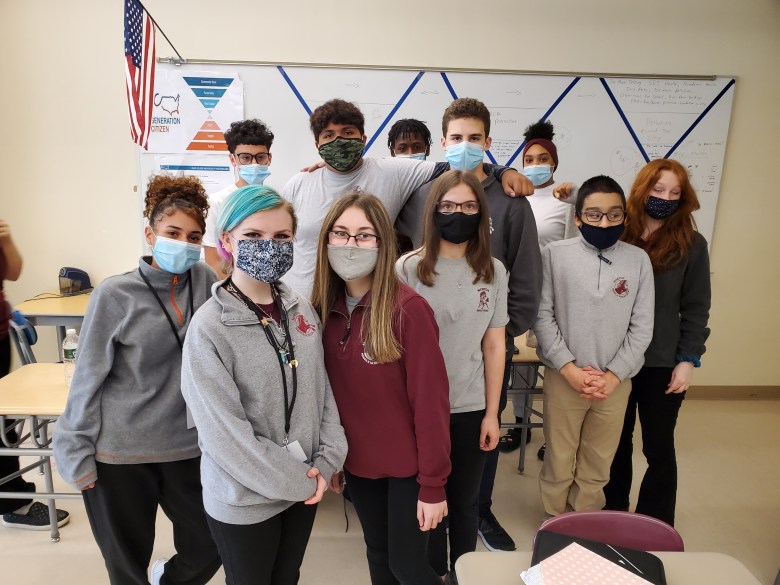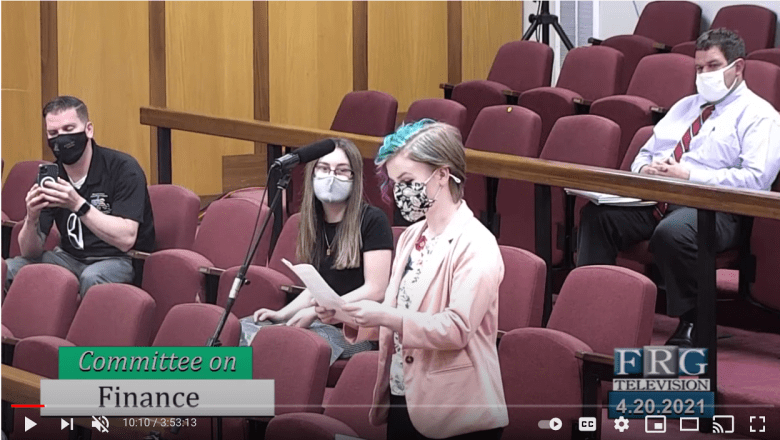Peyton Amaral, a Morton Middle-schooler with a pale pink suit jacket and a swath of blue and purple hair, stood before the Fall River City Council this April, arguing for a ban on plastic bags.

“Pollution is making our community dirty and unlivable,” said Peyton, in a voice that came through clearly, despite the mask covering the lower half of her face. “We, the youth of Fall River, want to stay here, but we can’t bear to stay in a city that is dirty.”
Peyton’s testimony is an example of “action civics,” a growing, if controversial, trend in American education of which Massachusetts is the undisputed leader. Under a first-in-the-nation law that took full effect this year, students from across the state must take part in at least two “student-led, nonpartisan civics projects” — one in eighth grade, and another in high school.

Proponents of action civics, an outgrowth of service learning that has students lobby for change in their communities, see it as a way to engage and empower students, preparing them for a lifetime of civic involvement. They liken it to a laboratory in science class, where students learn civics by doing civics.
“Students need to interact with the issues to understand the complexity of them, and the complexity of making change in their communities,” said Arielle Jennings, the New England executive director of Generation Citizen, whose action civics curriculum is used by 25,000 students nationwide, including 10,000 in Massachusetts.
But skeptics say students lack the foundational knowledge to be effective advocates. They point to dismal scores on national history and civics exams — less than 25 percent scored as proficient — as proof that schools need to spend more time teaching students core facts about our system of government, and warn that civics projects are displacing that instruction.
“I’m not opposed to civic action, but we can’t let the cart get ahead of the horse,” said David Davenport, a research fellow at the Hoover Institution, a conservative think tank at Stanford University. “In science, you don’t run around doing a bunch of experiments — you start with knowledge and develop a hypothesis first.”
Related: Can patriotism and criticism coexist in social studies?
Others worry that students with more conservative views are being pressured to lobby for liberal causes —particularly in programs, like Generation Citizen’s, that require classes to reach a consensus on an issue to focus on. In March, the National Association of Scholars, an organization focused on higher education, created a coalition dedicated to defending American Civics against “sustained assault by radical activists.”
“Students need to interact with the issues to understand the complexity of them, and the complexity of making change in their communities.”
Arielle Jennings, New England executive director of Generation Citizen
“The New Civics threatens to replace traditional civics education with Neo-Marxist ‘social justice’ propaganda, vocational training for left-wing activism, and Alinsky-style community organizing techniques,” the head of the association, Peter Wood, wrote in a blog announcing the coalition.
Larry Paska, the executive director of the National Council for the Social Studies, challenges this characterization of action civics, saying it’s far broader than political protest. In Fall River, for example, eighth graders surveyed students, put out a petition, and conducted a social media campaign before presenting before the City Council. Along the way, they sought strategic advice from state and national lawmakers, including former congressman Joe Kennedy III.

“It’s not about raising junior boycotters or junior activists, but about being an active, engaged citizen,” Paska said.
Related: Can we teach our way out of political polarization?
Brian Brady, the former longtime CEO of The Mikva Challenge, which coined the term “action civics” in 2007, and runs programs in a dozen states, said the vast majority of projects tackle “hyper-local” issues, such as students petitioning for a stop sign in a location where a classmate was killed by a car.
Brady said he was, on the one hand, “dumbfounded and mystified” by the attacks. “On the other, I’m not naïve — I understand there is a culture war happening and there are political points to be scored by attacking action civics,” he added.
In a study published last year, the Texas Public Policy Foundation, which promotes “free enterprise, liberty and personal responsibility,” argued there is a “progressive bias in the assumptions underlying many of the projects” listed on the websites of Generation Citizen and its allies. And even some advocates of action civics acknowledge that existing curricula and training programs lean to the left.
The fight over action civics playing out in Massachusetts and other parts of the country is part of a larger battle over whether social studies instruction should prioritize civic knowledge or civic skills and dispositions.
“I learned that if you present the facts, and show genuine concern, people will take you seriously, even if you’re young.”
Peyton Amaral, a middle schooler
Conservatives tend to believe that there are key facts and dates that all students must learn. Roughly 20 states require students to take or pass the test foreign nationals must take to attain U.S. citizenship before graduating. Liberals don’t dismiss civic knowledge, but many believe it’s equally important for students to learn the skills necessary to navigate the political process.
Teachers, for their part, tend to side with the liberals. In a 2019 survey conducted by The Rand Corporation, less than a third of public high school social studies teachers said it was “absolutely essential” that schools teach students facts and dates, a smaller percentage than said students should be prepared to be “activists who challenge the status quo of our political system and seek to remedy injustice.” About two-thirds of teachers said students must be able to identify the protections guaranteed by the Bill of Rights, but less than half said they must be knowledgeable about periods such as the American Founding, the Civil War, and the Cold War.
“It’s not about raising junior boycotters or junior activists, but about being an active, engaged citizen.”
Larry Paska, the National Council for the Social Studies
To be sure, there are many on both sides of the spectrum who believe civics education can — and should — teach both knowledge and skills.
“It’s a false choice between whether we should teach students in a traditional way, through direct instruction and rote facts, or through the opportunity to practice skills through service learning,” said Shawn Healy, senior director of policy and advocacy for iCivics, a nonprofit that “champions equitable, non-partisan civic education.”
Related: Slightly higher reading scores when students delve into social studies, study finds
Action civics differs from traditional “service learning” in that students are taught to tackle the root causes of a problem, rather than simply responding to it. Instead of conducting a community clean-up, for example, students might seek to stop the garbage (i.e. plastic bags) from accumulating in the first place.
Middle school, a time when many students lose interest in formal education, is an ideal time to introduce action civics, advocates say. Choosing a cause to fight for gives students a sense of agency and aids in identity formation, a key developmental milestone.

In Fall River, the response to the middle schoolers’ petition has been swift. City councilmembers have drafted an ordinance banning single-use plastic bags, and plan to vote on it soon.
Peyton, an aspiring actress, said testifying before the City Council was “a little nerve-wracking” but ultimately rewarding.
“I learned that if you present the facts, and show genuine concern, people will take you seriously, even if you’re young,” she said.
This story about action civics was produced by The Hechinger Report, a nonprofit, independent news organization focused on inequality and innovation in education. Sign up for Hechinger’s newsletter.




Teaching ‘action civics’ engages kids — and ignites controversy
Having kids become active in civics before they have much knowledge and life experience is like putting a non-driver in a car on a freeway and telling him/her/it to learn on the job. It’s insanity.
Thank you and I look forward to subscribing to your newsletter. Having read your article and visiting your website, I thought you would find this article of interest as well as the Our American Voice program (our american voice .org) which not only engages elementary and middle school students in action civics, but also includes history & civics education and is implemented in Illinois. Another site that might be of interest: citizen-u.org
The article I referred to above https://21stcitizens.net/pivot-points/patriotic-vs-civics-education/
I wonder if they decided on the merits of single use plastics before deciding to ban them?
For instance, what is going to replacement and what drawbacks will that effect. The road to food insecurity is paved with good intentions.
Im not sure if I think the students are naive for being taken in or if the teachers who suggest they should decide to change things are the naive ones.
Maybe they should teach them how to sue people. It’s probably a more useful skill.